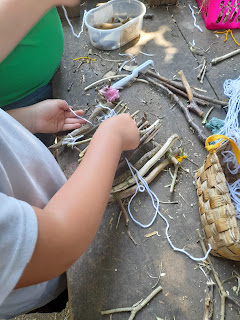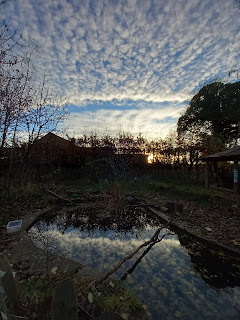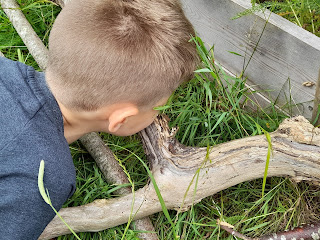Assessment rules
This week I started to assess the students who studied their Level 3 Forest School Leader course with us. Luckily for me, I started close at home with a colleague. I had criteria to focus on as well as an overall impression to form. It wasn't entirely a tick chart, there was room for comment, for justification of opinion, or example of success/failure. This is mostly guidance though, Forest School, like most of life, is a little more nuanced than a 'yes' or 'no'.
This became really evident when going over everything with the student afterwards. The ability to assess her own very good session was hampered by provisos on every point. She felt there was more she could have done, more she could have provided, more she could expand... And there probably was, but isn't that true of every session?
I've got used to the assessment part of my planning being a shorthand that few others would understand. A quick reference to say how to improve an activity, or to try it differently, or, frequently, how a child had adapted or altered it entirely into something better! I honestly can't remember when I last wrote 'went well', or 'great activity'.
Whatever we plan, it's open-ended. The children take the idea and the resources and create their own entertainment, explorations, investigations, and processes. Almost every session builds on a previous activity. Just when I think there is nothing left to do with sticks and wool a child wants to make a worry doll, or a horse, or a giraffe, or a carousel, or, or, or...
Whatever I may have provided as a starter idea will have been taken, reworked, redesigned, remodelled, and improved. Next time I put it out I will make sure it encompasses the adaptations the children invented, and more children will reinvent it into something newer.
Even activities such as bug hunting, which has in the past become snail racing,
woodlouse counting, close observation of an ant hill, and caterpillar collecting (and containing and watching the cycle of pupation and hatching moths etc), will suddenly divert. It became slug weighing last week! With no scales a mini see-saw was devised!
Strangely enough, it never occurred to me to set up slug weight charts as an activity!
Now considering weight watcher classes for invertebrates were NOT on my original plan, how could I assess it? If the plan had said 'hunting for woodlice' would that have made the activity a flop? The fact that the enthusiasm for hunting the creatures seemed to spread, and at one point half the class were actively involved, also meant that a lot of the other activities were ignored. Were those a failure? Should I not bother having binoculars and bird ID available? Or magnifiers and a nature table?
We are so used to seeing planning and assessing in a curriculum format, with a learning intention, usually a narrow one, that needs to be met. If this had been a maths activity which intended to create a graph, to show the range of minibeasts in Forest School, it would have been hard to tick the boxes on the lesson assessment as achieved.
I don't have narrow aims. There's a solid consistency in about half of the activities available, and the choice to explore them or ignore them remains with the individual child. There are seasonal activities which may be available for a whole term, like planting, or making Art in Situ with fallen leaves, and then there are new things to explore. If everyone is engaged elsewhere an activity may not make it out of the box this week. I will try again another time. I am not interrupting a child who is following their own learning to pull them away from concentrating, discovering and enjoying their task, to 'have a go' at something I have planned!
Obviously, there is always a little nudge here and there. Having built stick walls for their 'house' I told a group of year 4s it was amazing, then wondered aloud what it would look like with a roof before I wandered off...? And the four scurried off to work out how to add one. A couple of year 6 girls who had built frankly a mansion for a hedgehog, asked for my opinion. I praised all its features but pointed out a fox might be able to fit through the door, they took that on board and adapted their design.
we are constantly directing much of their learning, but we can't pre-plan it, and we can't tick chart it.
The rules for assessment within the curriculum seem to be lists of criteria which
transfer into data with reasonable ease.
But in Forest School assessment is continuous and different for each child and each activity. It allows different paces of progress. It allows different focuses of attention. It allows teamwork. It encourages children to help each other. Nothing makes me happier than overhearing children praising each other and assisting each other.
This week I stood back as a group of 3 girls talked a classmate down out of a tree. He was nervous. He wasn't very high, but was higher than he'd been before. One girl shimmied up into the branches so she could look him in the eyes and said "it's OK, we'll get down together". From below them two others told him to hold on there, and put his foot here, and slowly he descended to a round of applause and a pat on the back.
I was there to watch, ready to intervene if it looked dangerous.
I wasn't needed.
The learning: the compassion, the trust, the empathy, the bravery, the self-confidence, the balance, the gross motor skills, the communication, the pride, the self-esteem, the teamwork, the spatial awareness, and the pure camaraderie that the incident produced, is something I could never have planned, and have no idea how to assess!
What subject do we file it under? The life skills of recognising someone who needs help, of recognising when you yourself need help, and the will to offer that help are important to society, and there is no better way to exercise them than practically.
There is neither a tick chart for it, nor a learning intention, nor a data point value that covers it.
I now know those children so much better because of it.And they understand each other so much more because of it.
And that kind of ongoing assessment that we all do, all the time, THAT assessment rules.








Comments
Post a Comment